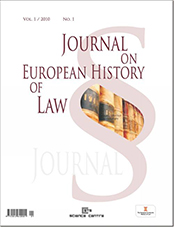Responses in Hungarian Constitutional Theory to the so-called anti-Jewish Laws (1938-1943)
Responses in Hungarian Constitutional Theory to the so-called anti-Jewish Laws (1938-1943)
Author(s): Gábor SchweitzerSubject(s): Law, Constitution, Jurisprudence
Published by: Evropská společnost pro právní dějiny, z.s.
Keywords: Jewish question; anti-Jewish legislation; discrimination; Hungary 1938-1943; World War II; legal equality of citizens; constitutional theory.
Summary/Abstract: During the discussion of anti-Jewish laws in Hungary after 1938, relevant in terms of constitutional law, were raised. These included the interpretation of the legal equality of citizens, racist attitudes seeping into Hungarian law, and the question of constitutionality of anti-Jewish laws. Representatives of Hungarian constitutional theory were divided over the ant-Jewish laws. Kálmán Molnár and Ödön Polner were firmly against anti-Jewish legislation because they regarded the limitation of the legal equality of citizens as unacceptable. Vilmos Szontagh and Albert Kaas, on the other hand, went practically as far as accepting discriminative constitutional legitimation, in as much as they harmonized anti-Jewish laws with the changed of view of constitution and they regarded the limitation of legal equality as acceptable with reference to the public good.
Journal: Journal on European History of Law
- Issue Year: 5/2014
- Issue No: 2
- Page Range: 67-72
- Page Count: 6
- Language: English

